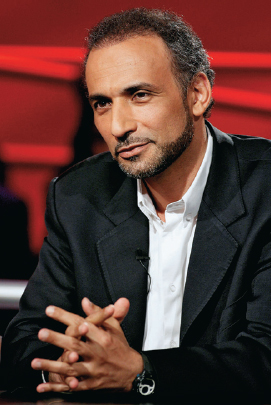Individuals in Society: Tariq Ramadan

Tariq Ramadan. (Salvatore Di Nolfi/Keystone)
Religious teacher, activist professor, and media star, Tariq Ramadan (b. 1962) is Europe’s most famous Muslim intellectual. He is also a controversial figure, praised by many as a moderate bridge-builder and denounced by others as an Islamic militant in clever disguise.
Born in Switzerland of Egyptian ancestry, Ramadan is the grandson of Hassan al-Banna, the charismatic founder of the powerful Muslim Brotherhood. Al-Banna, who was assassinated in 1949, fought to reshape Arab nationalism within a framework of Islamic religious orthodoxy and anti-British terrorism. Tariq grew up in Geneva, where his father had sought refuge in 1954 after Egyptian president Gamal Abdel Nasser’s anti-Islamic crackdown. He attended mainstream public schools, played soccer, and absorbed a wide-ranging Islamic heritage. For example, growing up fluent in French and Arabic, he learned English mainly from listening to Pakistani Muslims discuss issues with his father, who represented the Muslim Brotherhood and its ideology in Europe.
Ramadan studied philosophy and French literature as an undergraduate at the University of Geneva, and then earned a doctorate in Arabic and Islamic studies. Marrying a Swiss woman who converted to Islam, Ramadan moved his family to Cairo in 1991 to study Islamic law and philosophy. It proved to be a pivotal experience. Eagerly anticipating the return to his Muslim roots, Ramadan gradually realized that only in Europe did he feel truly at home. From this experience he concluded that Western Muslims should participate fully as active citizens and feel “at home” in their adopted countries. In developing this message, Ramadan left the classroom and became a publicly prominent intellectual, writing nonscholarly books and making audio recordings that sell tens of thousands of copies.
Slim and elegant in well-tailored suits and open collars, Ramadan is a brilliant speaker. His public lectures in French and English draw hundreds of Muslims and curious non-Muslims. He argues that Western Muslims have fundamental legal rights and can freely practice their religion, noting that they are often more secure than believers in the Muslim world, where governments are frequently repressive and arbitrary. According to Ramadan, Islamic teaching requires Western Muslims to obey Western laws, although in rare cases they may need to plead conscientious objection and disobey on religious grounds. Becoming full citizens and refusing to live as the foreign Other, Muslims should work with non-Muslims on matters of common concern, such as mutual respect, better schools, and economic justice.*
Ramadan is most effective with second- and third-generation Western Muslims who are also college graduates. He urges them to think for themselves and to distinguish the sacred revelation of Islam from the nonessential cultural aspects of Muslim life that their parents brought from Africa and Asia.
With growing fame has come growing controversy. In 2004, preparing to take up a professorship in the United States, he was denied an entry visa on the grounds that he had contributed to a Palestinian charity with ties to terrorists. Defenders disputed the facts and charged that his criticism of Israeli policies and the invasion of Iraq were the real reasons for the denial. Ramadan’s critics also claim that he says different things to different groups: hard-edged criticism of the West found on recordings for Muslims belies the reasoned moderation of his books. Some critics argue that his recent condemnation of Western capitalism and globalization is an opportunistic attempt to win favor with European leftists and does not reflect his self-proclaimed Islamic passion for justice. Yet in 2010, the U.S. State Department lifted the ban that prevented Ramadan from entering the United States, and the scholar’s reputation remains intact.† An innovative bridge-builder, he symbolizes the growing importance of Europe’s Muslim citizens.
*See, especially, Tariq Ramadan, Western Muslims and the Future of Islam (Oxford: Oxford University Press, 2004).
† See Ian Buruma, “Tariq Ramadan Has an Identity Issue,” New York Times Magazine, February 4, 2007.
- What is Ramadan’s message to Western Muslims? How did he reach his conclusions?
- Do you think Ramadan’s ideas are realistic? Why?
